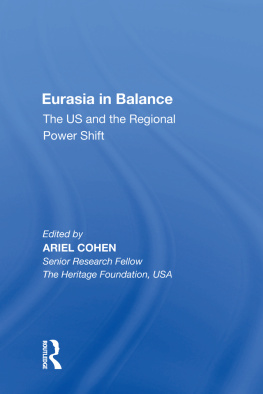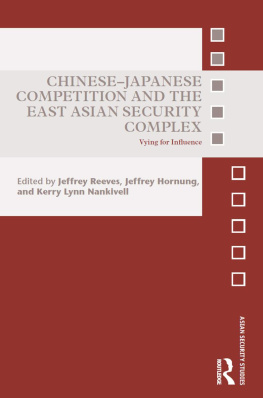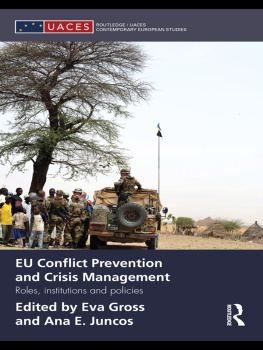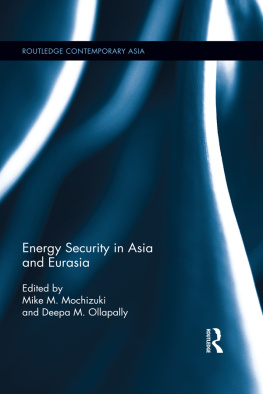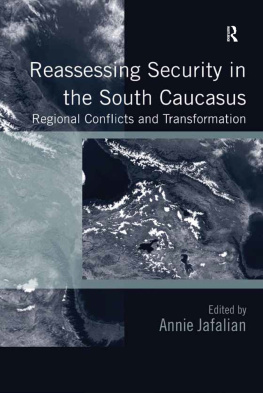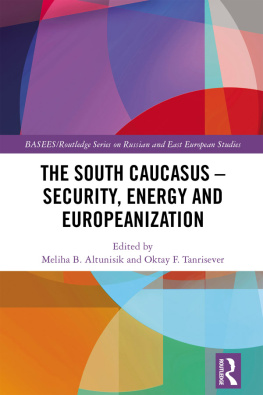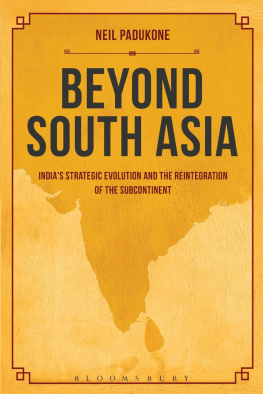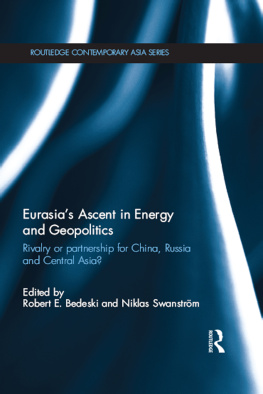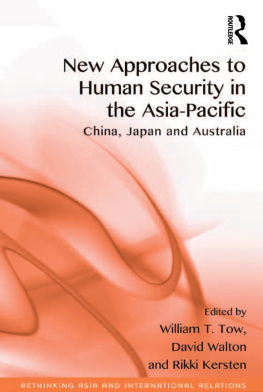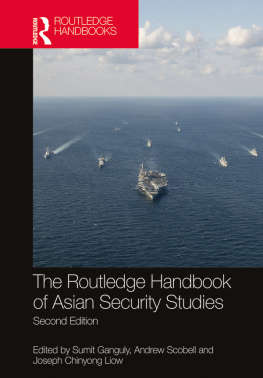EURASIA IN BALANCE
US Foreign Policy and Conflict in the Islamic World Series
Series Editors:
Tom Lansford
University of Southern Mississippi, USA
Jack Kalpakian
Al Akhawayn University, Morocco
The proliferation of an anti-US ideology among radicalized Islamic groups has emerged as one of the most significant security concerns for the United States and contemporary global relations in the wake of the end of the Cold War. The terrorist attacks of September 11, 2001 demonstrated the danger posed by Islamic extremists to US domestic and foreign interests. Through a wealth of case studies this new series examines the role that US foreign policy has played in exacerbating or ameliorating hostilities among and within Muslim nations as a means of exploring the rise in tension between some Islamic groups and the West. The series provides an interdisciplinary framework of analysis which, transcending traditional, narrow modes of inquiry, permits a comprehensive examination of US foreign policy in the context of the Islamic world.
Other titles in the series
Uneasy Neighbors
India, Pakistan and US Foreign Policy
Kanishkan Sathasivam
ISBN 0 7546 3762 X
US Foreign Policy and the Persian Gulf
Safeguarding American Interests through Selective Multilateralism
Robert J. Pauly, Jr
ISBN 0 7546 3533 3
Strategic Preemption
US Foreign Policy and the Second Iraq War
Robert J. Pauly, Jr and Tom Lansford
ISBN 07546 3975 4
Eurasia in Balance
The US and the Regional Power Shift
Edited by
Ariel Cohen
Senior Research Fellow
The Heritage Foundation, USA
First published 2005 by Ashgate Publishing
Reissued 2018 by Routledge
2 Park Square, Milton Park, Abingdon, Oxon, OX14 4RN
711 Third Avenue, New York, NY 10017, USA
Routledge is an imprint of the Taylor & Francis Group, an informa business
Ariel Cohen 2005
Ariel Cohen has asserted his right under the Copyright, Designs and Patents Act, 1988, to be identified as the editor of this work.
All rights reserved. No part of this book may be reprinted or reproduced or utilised in any form or by any electronic, mechanical, or other means, now known or hereafter invented, including photocopying and recording, or in any information storage or retrieval system, without permission in writing from the publishers.
A Library of Congress record exists under LC control number: 2004030881
Notice:
Product or corporate names may be trademarks or registered trademarks, and are used only for identification and explanation without intent to infringe.
Publishers Note
The publisher has gone to great lengths to ensure the quality of this reprint but points out that some imperfections in the original copies may be apparent.
Disclaimer
The publisher has made every effort to trace copyright holders and welcomes correspondence from those they have been unable to contact.
ISBN 13: 978-0-815-38888-3 (hbk)
ISBN 13: 978-1-351-15876-3 (ebk)
Stephen Blank is Professor of Russian National Security Studies at the Strategic Studies Institute of the US Army War College. Prior to this Dr. Blank was Associate Professor for Soviet Studies at the Center for Aerospace Doctrine, Research, and Education of Air University at Maxwell AFB. Dr. Blank's M.A. and Ph.D. are in Russian History from the University of Chicago. He has published over 380 articles and monographs on Soviet/Russian military and foreign policies. His most recent book is Imperial Decline: Russia's Changing Role in Asia, Duke University Press, 1997 which he co-edited with Professor Alvin Rubinstein of the University of Pennsylvania.
Ariel Cohen , a Research Fellow in Russian and Eurasian Studies with The Heritage Foundation, is often called on to testify on Russian and former Soviet politics, energy policy, economics, and law before the US Congress. Dr. Cohen also specializes in international energy security. He serves as a consultant to both the executive branch and the private sector on topics of his expertise.
He has published extensively and regularly provides commentary on Russian and Eurasian affairs for CNN, FOX, all three NBC networks, ABC, BBC-TV, and all many national TV channels in Russia, Ukraine and other countries of the former Soviet Union, Eastern and Central Europe. He is a weekly contributor to the Voice of America radio and TV programs. Dr. Cohen wrote for The Wall Street Journal, The Washington Post, The Washington Times, The Journal of Commerce, and many other publications. Cohen is on the Board of Editors for Central Asia and Caucasus Journal (Sweden), and Board of Advisers of Caspian Crossroads. He is also on the Advisory Board of the Potomac Institute for Public Policy Terrorism Studies Center and a member of Deterrence Analysis Center at National Institute for Public Policy (NIPP). Dr. Cohen has managed media research projects for Radio Liberty's then-Soviet audience. His book, Russian Imperialism: Development and Crisis, was published in 1996 and in 1998 by Greenwood/Praeger. He is a member of the Council of Foreign Relations, International Institute for Strategic Studies, American Association for Advancement of Slavic Studies, and Association for Study of Nationalities, He earned his Ph.D. and Masters at the Fletcher School of Law and Diplomacy at Tufts University and his L.L.B. at Bar Ilan University Law School in Israel.
Svante E. Cornell is Deputy Director of the Central Asia-Caucasus Institute and Assistant Research Professor at the Nitze School of Advanced International Studies, Johns Hopkins University. He is also Research Director of the Silk Road Studies Program and Associate Professor of East European Studies at Uppsala University, Sweden. He is the Editor of the Central Asia-Caucasus Analyst (www.cacianalyst.org). He holds a Ph.D. degree in Peace and Conflict Studies from Uppsala University, an Honorary Doctorate from the Academy of Sciences of Azerbaijan, and a degree in international relations from the Middle East Technical University, Ankara, Turkey.
Robert O. Freedman is the Peggy Meyerhoff Pearlstone Professor of Political Science at Baltimore Hebrew University and is Visiting Professor of Political Science at Johns Hopkins University. Among his recent publications are Moscow and the Middle East (Cambridge, England: Cambridge University Press, 1991), Israel Under Rabin (Boulder, Colorado: Westview Press, 1995), The Middle East and the Peace Process (Gainesville, Florida: University Press of Florida, 1998) and The Middle East Enters the 21st Century (Gainesville, Florida: University Press of Florida, 2002). Dr. Freedman has also served on a number of US missions to discuss the contemporary Middle East with scholars and government leaders in Russia and China.
Ali M. Koknar is a Washington, D.C.-based private security consultant. Originally from Turkey, he studied law and business management in his native country and in South Africa before moving to the United States. With a background in international trade, aviation and law enforcement, he specializes in counter-terrorism and organized crime in the Near East, Balkans, Caucasus, Central Asia and sub-Saharan Africa. His e-mail is akoknar@aol.com.
Dina R. Spechler (Ph.D., Harvard University) is Associate Professor of Political Science at Indiana University. Her books include Permitted Dissent in the USSR and Domestic Influences on Soviet Foreign Policy. Her current research in on major changes in the foreign policies of Russia, the USA, and Israel.

